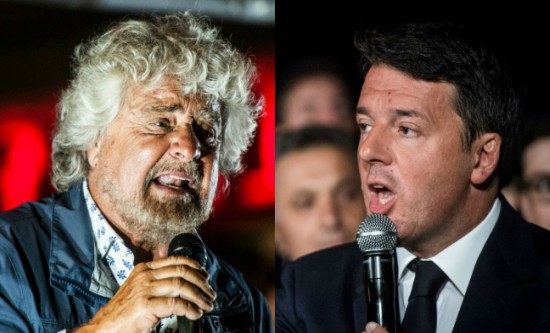
Beppo Grillo and Matteo Renzi
After years of compromise, neoliberalism and austerity, Italy’s ‘centre left’ Democratic Party has been punished at the polls. Having won only 18% of the vote in the 4 March election, party leader Matteo Renzi resigned. In a hung parliament, the ‘anti-establishment’ Five Star Movement won the largest share of the vote with 32% and Lega, an explicitly hard right anti-immigration party, quadrupled its share to 18%. Lega has an electoral pact with Silvio Berlusconi’s conservative Forza Italia – which with 14% of the vote is weaker than ever – and two smaller parties, but they did not win enough seats between them to take power. It is likely that Five Star will head up a coalition government. The continued malaise on the Italian left meant limited political options mixed with resentment towards austerity and immigration left the emerging parties with an open goal. Brian Henry reports.
Four years of modest economic growth was never going to be enough to quell widespread discontent in Italy, which experienced not just a deep slump after the 2008-09 financial crash but a second two-year recession in 2012-13. Along with Greece it is the only nation in the Organisation for Economic Co-operation and Development that has yet to see economic activity surpass pre-financial-crisis levels. Wages are stagnant and unemployment is high. A third of under-25s are still without work – double the average for the EU. Membership of the euro has also played a role in the rise of populism in Italy, because it has made it impossible for governments in Rome to restore competitiveness by devaluing the currency as they did regularly in the days before monetary union.
But race and immigration were also at the heart of this election. On 2 February a fascist shot six African migrants in the city of Macerata, central Italy. The leaders of right-wing parties promised to deport 600,000 migrants. The country has seen a high influx of migrants travelling through the Mediterranean Sea since NATO’s destruction of Libya in 2011. The Democratic Party was hardly an advocate of open borders but it has been portrayed as soft on immigration. The refrain from the right is familiar: migration is unaffordable and overburdens public services and the jobs market.
In all, the neoliberal and centre left parties which between them won 70% of the vote in 2008 nosedived to 34%. Yet the left, still to recover from the abandonment of the CPI in 1991, was in no position to take advantage. Free and Equal, a soft-left force, scored 3.5%, and the more radical Potere al Popolo (Power to the People) coalition just over 1%.
The Five Star Movement performed much better in the election than expected. The party is a petit bourgeois mishmash of left and right united by a disgust for the ‘establishment’ and their deteriorating living conditions. While it demands a universal basic income for Italy’s poor, its leader Beppo Grillo, a comedian, is right-wing and anti-immigration. He has denounced NGO ‘migrant taxis’ and called for a target of ‘zero boats’ with migrants from Africa. Five Star is eurosceptic but has abandoned calls for a referendum on EU membership. It promises to make Italy ‘normal’ and free of corruption and inefficiency, but has already abandoned its own anti-corruption charter. What it would or could do at the head of a coalition government remains to be seen.




